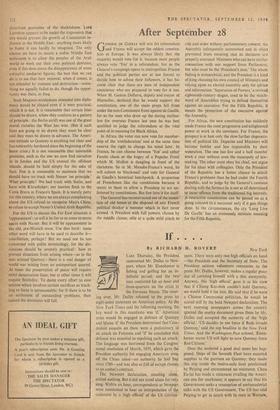After September 28
GENERAL DE GAULLE will win his referendum and France will accept the oddest constitu- tion in Europe. It was always likely that the majority would vote for it, because most people always vote 'Yes' in a referendum, but as the General's campaign opens in metropolitan France and the political parties are at last forced to decide how to advise their followers, it has be- come clear that there are men of independent conscience who are prepared to vote for it too. When M. Gaston Defferre, deputy and mayor of Marseilles, declared that he would support the constitution, one of the main props fell from under the non-Communist front against.de Gaulle, for as the man who drew up the daring outline- law for overseas France last year he was best qualified to judge the referendum at the vital point of its meaning for Black Africa.
In Africa, the voter can now vote for member-' ship of the 'confederation' and at the same time reserve the right to change his mind later. In France, he can choose between `Yes' and either Fascist chaos or the bogey of a Popular Front which M. Monett is dangling in front of the electorate. So in M. Mendes-France's word, he will submit to 'blackmail' and vote for General de Gaulle's historical hotchpotch. A proportion of Frenchmen like the constitution because it seems to them to allow a President to act un- fettered by constitutions. But few love it for itself.
The General•has reconstructed out of the moun- tain of old bones at the disposal of any French political thinker a' monster which in fact never existed. A President with full powers, chosen by the middle classes, able at a quite mild pinch to rule and order without parliamentary consent. An Assembly infrequently summoned and in effect prevented from ensuring that its decisions are properly executed. Ministers who can have neither connection with nor support from Parliament, but who must be the 'President's men.' The whole feeling is monarchical, and the President is a kind of king choosing his own council of Ministers and relying upon an elected assembly only for advice and information. 'Separation of Powers,' a revived eighteenth-century slogan, used to be the watch- word of Assemblies trying to defend themselves against an executive. For the Fifth Republic, it means the protection of the executive against the Assembly.
For Africa, the new constitution has suddenly made France the most progressive and enlightened power at work in the continent. For France, the prospect is at best only the slow further degenera- tion of political life. Deputies and Ministers will become' feebler and less responsible by their separation. The one has five and a half months' work a year without even the monopoly of law- making. The other must obey his chief, not argue for his ideas with colleagues. Only the President of the Republic has a better chance to attack France's problems than he had under the Fourth Republic, and to judge by the General's cautious dealing with the farmers he is not at all determined to incur offence from the traditional big interests. A restrictive constitution can be passed on as a going concern to a successor only if it gets things done. In the circumstances, the cry 'Long Live De Gaulle' has an ominously intimate meaning for the Fifth Republic.


































 Previous page
Previous page